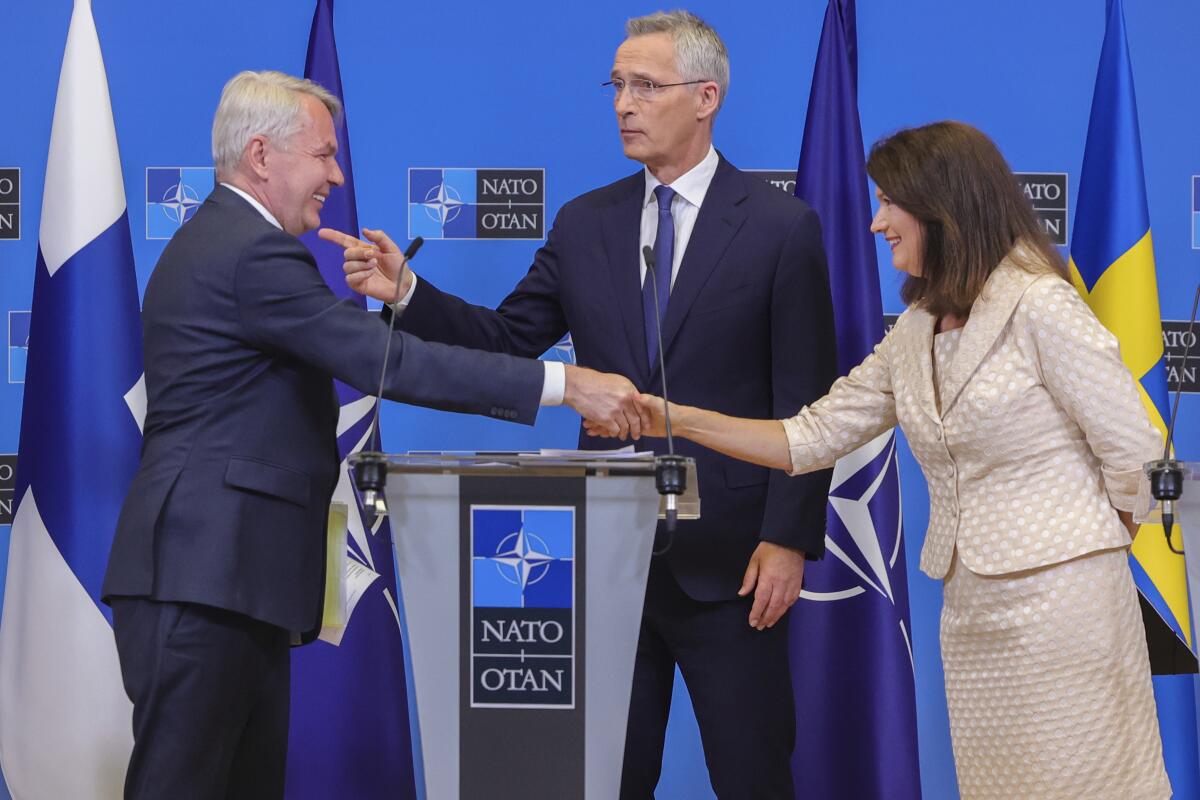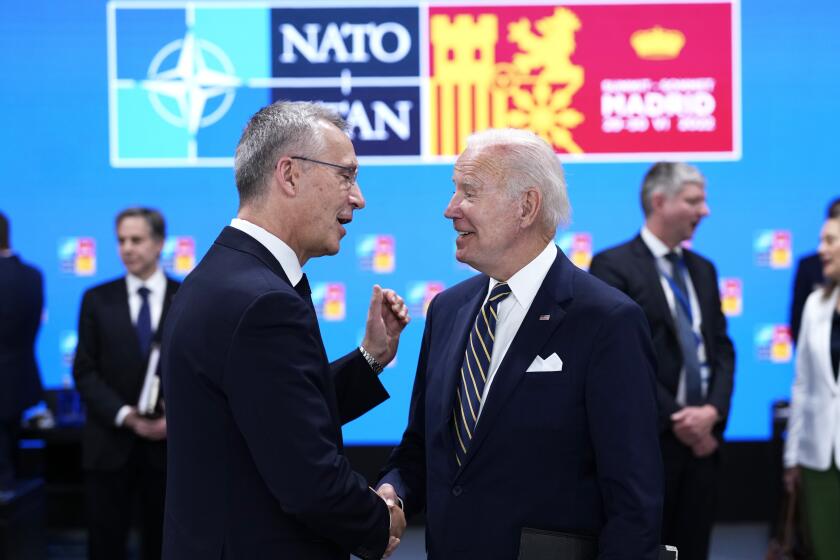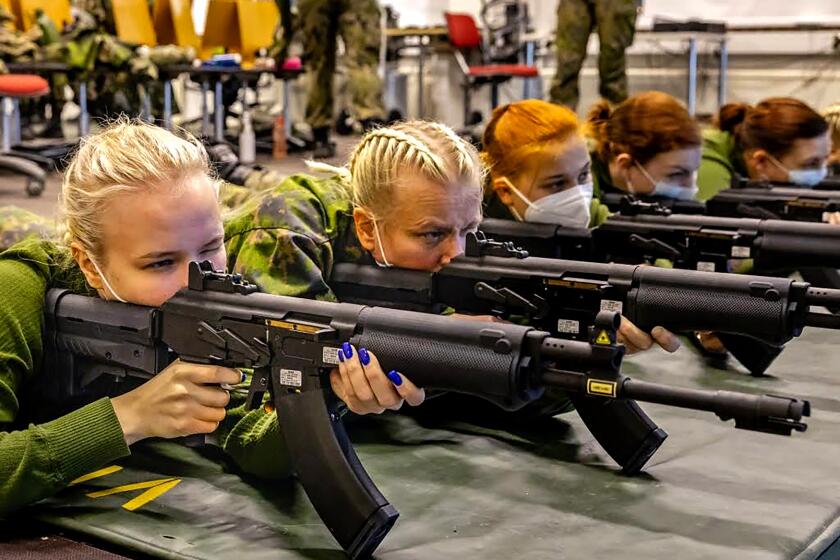Senate backs NATO membership for Finland and Sweden, rebuking Russia

- Share via
WASHINGTON — U.S. senators delivered overwhelming bipartisan approval to NATO membership for Finland and Sweden on Wednesday, calling expansion of the Western defensive bloc a “slam-dunk” for U.S. national security and a day of reckoning for Russian President Vladimir Putin over his invasion of Ukraine.
Wednesday’s 95-1 vote — for the candidacy of two Western European nations that, until Russia’s war against Ukraine, had long avoided military alliances — took a crucial step toward expansion of the North Atlantic Treaty Organization and its 73-year-old pact of mutual defense among the United States and its allies in Europe.
Senate Majority Leader Charles E. Schumer invited ambassadors of the two nations to the chamber gallery to witness the vote.
President Biden, who has been a principal player in rallying global economic and material support for Ukraine, has sought quick entry for the two previously non-militarily-aligned northern European nations.
“This historic vote sends an important signal of the sustained, bipartisan U.S. commitment to NATO, and to ensuring our Alliance is prepared to meet the challenges of today and tomorrow,” Biden said in a statement Wednesday evening.
“I look forward to signing the accession protocols and welcoming Sweden and Finland, two strong democracies with highly capable militaries, into the greatest defensive alliance in history,” the president added.
Approval from all member nations — currently, 30 — is required. The candidacies of the two prosperous northern European nations have won ratification from more than half of the NATO member nations in the roughly three months since the two applied. It’s a purposely rapid pace meant to send a message to Russia over its six-month-old war against Ukraine’s West-looking government.
“It sends a warning shot to tyrants around the world who believe free democracies are just up for grabs,” Sen. Amy Klobuchar (D-Minn.) said in the Senate debate ahead of the vote.
“Russia’s unprovoked invasion has changed the way we think about world security,” she added.
NATO gets blowback from Moscow and Beijing after it declared Russia a ‘direct threat’ and said China posed ‘serious challenges’ to global stability.
Senate Minority Leader Mitch McConnell, who visited Kyiv, the Ukrainian capital, earlier this year, urged unanimous approval. Speaking to the Senate, McConnell (R-Ky.) cited Finland’s and Sweden’s well-funded, modernizing militaries and their experience working with U.S. forces and weapons systems, calling it a “slam-dunk for national security” of the United States.
“Their accession will make NATO stronger and America more secure. If any senator is looking for a defensible excuse to vote no, I wish them good luck,” McConnell said.
Sen. Josh Hawley (R-Mo.), who often aligns his positions with those of the most ardent supporters of former President Trump, cast the only no vote. Hawley took the Senate floor to call European security alliances a distraction from what he called the United States’ chief rival — China, not Russia.
“We can do more in Europe ... devote more resources, more firepower ... or do what we need to do to deter Asia and China. We cannot do both,” Hawley said, calling his a “classic nationalist approach” to foreign policy.
Finland has long seen Russia as a threat. Now politicians and ordinary Finns are saying it aloud.
Sen. Tom Cotton of Arkansas, like Hawley a potential 2024 presidential contender, rebutted those points without naming his potential Republican rival.
That included arguing against Hawley’s contention that a bigger NATO would mean more obligations for the U.S. military, the world’s largest. Cotton was one of many citing the two nations’ military strengths — including Finland’s experience securing its hundreds of miles of border with Russia and its well-trained ground forces, and Sweden’s well-equipped navy and air force.
They’re “two of the strongest members of the alliance the minute they join,” Cotton said.
U.S. State and Defense officials consider the two countries net “security providers,” who will strengthen NATO’s defense posture in the Baltics in particular. Finland is expected to exceed NATO’s defense spending target of 2% of the country’s gross domestic product in 2022, and Sweden has committed to meet the 2% goal.
That’s in contrast to many recent NATO newcomers that were formerly in the orbit of the Soviet Union, many with smaller militaries and economies. North Macedonia, NATO’s most recent addition, had an active military of just 8,000 personnel when it joined in 2020.
Senators’ votes approving NATO candidacies often are lopsided — the vote on North Macedonia was 91 to 2. But Wednesday’s approval from nearly all senators present carried added foreign policy weight in light of Russia’s war.
Schumer (D-N.Y.) said he and McConnell had committed to the country’s leaders that the Senate would approve the ratification resolution as quickly as possible to bolster the alliance, “in light of recent Russian aggression.”
Sweden and Finland applied in May, setting aside their long-standing stance of military nonalignment. It was a major shift of security arrangements for the two countries after neighboring Russia launched its war on Ukraine in late February. Biden encouraged their joining and welcomed the two countries’ government heads to the White House in May, standing side by side with them in a signal of U.S. backing.
The U.S. and its European allies have rallied with newfound cooperation in the face of Putin’s invasion of Ukraine and his sweeping condemnations of NATO this year in statements that included veiled reminders of Russia’s nuclear arsenal and asserted its historical claims to the territory of many of its neighbors.
“Enlarging NATO is exactly the opposite of what Putin envisioned when he ordered his tanks to invade Ukraine,” Sen. Robert Menendez (D-N.J.), chairman of the Senate Foreign Relations Committee, said Wednesday, adding that the West could not allow Russia to “launch invasions of countries.”
Wednesday’s vote by Republicans and Democrats stood out in the normally slow-moving and divided chamber. Senators voted down a proposed amendment by Sen. Rand Paul (R-Ky.) intended to ensure that NATO’s guarantee to defend its members does not replace a formal role for Congress in authorizing the use of military force. Paul, a longtime advocate of keeping the U.S. out of most military action abroad, voted “present” on the ratification of Sweden and Finland’s membership bid.
Senators approved another amendment from Sen. Daniel Sullivan (R-Alaska) declaring that all NATO members should spend a minimum of 2% of their GDP on defense and 20% of their defense budgets on major equipment, including research and development.
Each member government in NATO must give its approval for any new member to join. The process ran into unexpected trouble when Turkey raised concerns over adding Sweden and Finland, accusing the two of being soft on banned Turkish Kurdish exile groups. Turkey’s objections could still block the two countries’ membership.
More to Read
Sign up for Essential California
The most important California stories and recommendations in your inbox every morning.
You may occasionally receive promotional content from the Los Angeles Times.















